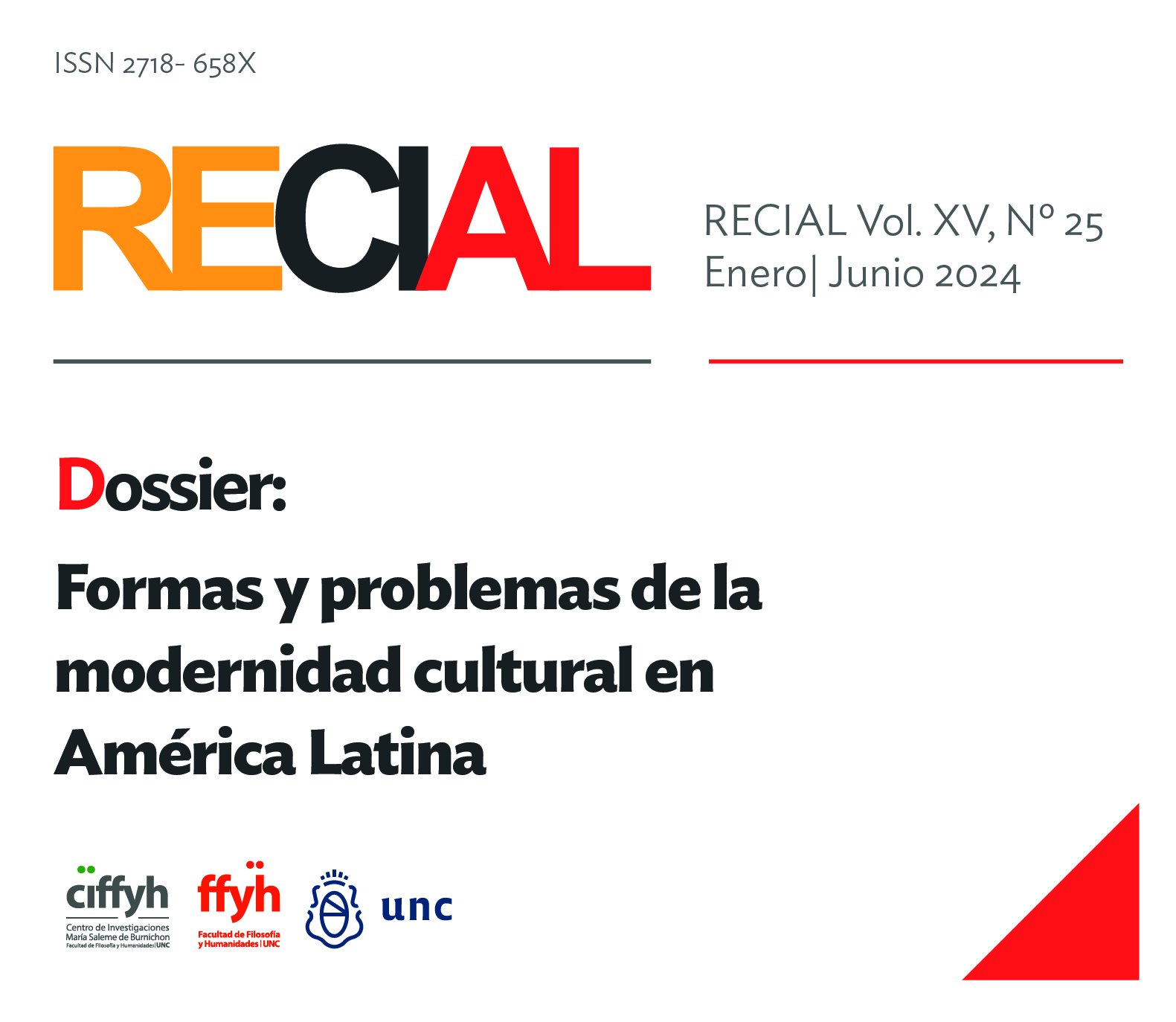Modernity, Authoritarianism, and Human Rights in Nelson Pereira dos Santos's Cinema
DOI:
https://doi.org/10.53971/2718.658x.v15.n25.45621Keywords:
modernity, Memórias do cárcere, Nelson Pereira dos Santos, engaged intellectuals, criminalityAbstract
This article advances a reinterpretation of Brazilian cultural modernity based on a reconsideration of the political and ideological links between intellectuals and criminals that took place from the first government of Getúlio Vargas (1930-1945) onwards. I argue that the temporary coexistence of political prisoners and common criminals during a period characterized by authoritarian policies in Brazil in the 1930s was crucial in forming alliances within the prison system because it made the needs of a population victimized by state violence visible. Using a methodological and critical framework provided by Brazilian cinema history, I focus on Memórias do Cárcere (1984), a film by the celebrated director Nelson Pereira dos Santos based on the homonymous work by writer Graciliano Ramos. Ramos’s extrajudicial imprisonment during the Vargas regime, in my view, serves as the point of connection between the situation of the intellectual of modernity subject to various forms of censorship and repression, and the very image of the criminal during Brazil’s authoritarian period (1964-1985). In both cases, political consciousness establishes horizontal relationships among the prison population which helps reimagine the carceral space beyond the mere reproduction of unequal and oppressive social relations.
Downloads
References
AA.VV. (2013). Memórias do cárcere de Graciliano Ramos. São Paulo: Instituto Moreira Salles.
Agamben, G. (1998). Homo Sacer: Sovereign Power and Bare Life. Stanford: Stanford UP.
Alves, F. C. (2016). Armas de papel: Graciliano Ramos, as 'Memórias do cárcere' e o Partido Comunista Brasileiro. São Paulo: Editora 34.
Aufderheide, P. (1985). Memorias de Carcere. Film Quarterly, 38(3), 50-53.
Barnard, T. (1996). Memórias do Cárcere. En T. Barnard y P. Rist (Eds.), South American Cinema: A Critical Filmography, 1915-1994 (pp. 202-204). Austin: Texas UP.
Barros, E. (2016). Memórias do cárcere. En P. H. Silva (Ed.), 100 melhores filmes brasileiros (pp. 142-147). Belo Horizonte: Letramento.
Bazin, A. (1967). In Defense of Mixed Cinema. En Autor, What Is Cinema? (pp. 53-75). Berkeley/Los Angeles: California UP.
Bazin, A. (1990). Ontología de la imagen fotográfica. En Autor, ¿Qué es el cine? (pp. 23-31). Madrid: Rialp.
Bernardet, J. C. (2007). Brasil em tempo de cinema: ensaio sobre o cinema brasileiro de 1958 a 1966. São Paulo: Companhia das Letras.
Biondi, K. (2010). Junto e misturado: uma etnografia do PCC. São Paulo: Terceiro Nome.
Biondi, K. y Marques, A. (2010). Memória e historicidade em dois 'comandos' prisionais. Lua Nova, 79, 39-70.
Bosi, A. (1997). História concisa da literatura brasileira. São Paulo: Cultrix.
Chaui, M. (2013). Brasil: mito fundador e sociedade autoritária. En A. Rocha (Ed.), Manifestações ideológicas do autoritarismo brasileiro (pp. 147-237). São Paulo: Autêntica.
Dutra, E. de Freitas. (2001). Memórias do cárcere: do livro ao filme, do filme à História. En M. de Carvalho Soares y J. Ferreira (Eds.), A História vai ao cinema (pp. 147-160). Río de Janeiro: Record.
Echeverría, B. (2010). Modernidad y blanquitud. México: Era.
Fausto, B. (2012). História do Brasil. São Paulo: Editora da Universidade de São Paulo.
Fernandes, R. C. (2001). Prefácio à primeira edição. En Quatrocentos contra um: uma história do Comando Vermelho de William da Silva Lima (2 ed., pp. 13-14). São Paulo: Labortexto Editorial.
García Canclini, N. (1989). Culturas híbridas: estrategias para entrar y salir de la modernidad. México: Grijalbo.
González Casanova, P. (1985). La democracia en México. México: Era.
González Casanova, P. (2006). Sociología de la explotación. Buenos Aires: CLACSO.
Hutcheon, L. (2013). A Theory of Adaptation. London: Routledge.
Jaguaribe, B. (2004). Favelas and the Aesthetics of Realism: Representations in Film and Literature. Journal of Latin American Cultural Studies, 13(3), 327-342.
Johnson, R. y Stam, R. (1995). The Shape of Brazilian Film History. En Autores (Eds.), Brazilian Cinema (pp. 15-51). New York: Columbia UP.
Kushner, R. (17 de abril de 2019). Is Prison Necessary? Ruth Wilson Gilmore Might Change Your Mind. The New York Times. Recuperado de https://www.nytimes.com/2019/04/17/magazine/prison-abolition-ruth-wilson-gilmore.html.
Larraín, J. (2000). Identity and Modernity in Latin America. Cambridge: Polity Press.
Lehnen, J. (2022). Neo-Authoritarian Masculinity in Brazilian Crime Film. Gainesville: Florida UP.
Leitch, Th. (2007). Film Adaptation and Its Discontents: From Gone with the Wind to The Passion of the Christ. Baltimore: The Johns Hopkins UP.
Lillo, G. (2019). La adaptación cinematográfica como interacción dialógica con el texto literario. En G. Pollarolo (Ed.). Nuevas aproximaciones a viejas polémicas: cine/literatura (pp. 63-82). Lima: Pontificia Universidad Católica del Perú.
Lima, W. da Silva. (2001). Quatrocentos contra um: uma história do Comando Vermelho. São Paulo: Labortexto Editorial.
Misse, M. (2011). Crime organizado e crime comum no Rio de Janeiro: diferenças e afinidades. Revista de sociologia e política, 19(40), 13-25.
Montaldo, G. (2016). Modernidad. Y. Martínez-San Miguel, B. Sifuentes-Jáuregui y M. Belausteguigoitia (Eds.), Critical Terms in Caribbean and Latin American Thought: Historical and Institutional Trajectories (pp. 153-164). New York: Palgrave Macmillan,
Oubiña, D. (2019). Literatura y cine: lo inconmensurable. En G. Pollarolo (Ed.), Nuevas aproximaciones a viejas polémicas: cine/literatura (pp. 33-37). Lima: Pontificia Universidad Católica del Perú.
Penglase, B. (2008). The Bastard Child of the Dictatorship: The Comando Vermelho and the Birth of 'Narco-culture' in Rio de Janeiro. Luso-Brazilian Review, 45(1), 118-145.
Pollarolo, G. (Ed.). (2019). Nuevas aproximaciones a viejas polémicas: cine/literatura. Lima: Pontificia Universidad Católica del Perú.
Quijano, A. (2014). Colonialidad del poder y clasificación social. En D. Assis Clímaco (Ed.), Cuestiones y horizontes: de la dependencia histórico-estructural a la colonialidad/descolonialidad del poder (pp. 285-327). Buenos Aires: CLACSO.
Quijano, A. y Wallerstein, I (1992). Americanity As a Concept, or the Americas in the Modern World-System. International Social Science Journal, 44(4), 549-557.
Rama, Á. (2002). La ciudad letrada. Hanover: Ediciones de Norte.
Ramos, G. (1965). Memórias do cárcere (vol. 1). São Paulo: Livraria Martins.
Ramos, P. R. (2007). Nelson Pereira dos Santos: resistência e esperança de um cinema. Estudos Avançados, 21(59), 323-352, doi:https://doi.org/10.1590/S0103-40142007000100026.
Ramos, P. R. (2019). Memórias do cárcere: Da literatura ao cinema. São Paulo: Alameda.
Reddy, Ch. (2007). Modern. En B. Burgett y G. Hendler (Eds.), Keywords for American Cultural Studies (pp. 160-164). New York: New York UP.
Rocha, G. (1981). Revolução do Cinema Novo. Rio de Janeiro: Alhambra/Embrafilme.
Sadlier, D. J. (2003). Nelson Pereira dos Santos. Chicago: Illinois UP.
Salem, H. (1997). Nelson Pereira dos Santos: el sueño posible del cine brasileño. Madrid: Cátedra.
Salem, H. (1999). Nelson Pereira dos Santos: Doce guerreiro reinventor do cinema brasileiro. Cinémas d'Amérique Latine, 7, 86-87.
Santiago, S. (1982). Arrumar a casa, arrumar o país. En Autor, Vale quanto pesa (Ensaios sobre questões político-culturais) (pp. 65-68). São Paulo: Paz e Terra.
Santos, N. Pereira dos (Dir.). (1984). Memórias do Cárcere. Brasil: Riofilme.
Santos, N. Pereira dos (2013). Oito Notas para entrar e sair do cárcere. En Autor, Memórias do cárcere de Graciliano Ramos (pp. 5-7). São Paulo: Instituto Moreira Salles.
Schwarcz, L. M. (2019). Sobre o autoritarismo brasileiro. São Paulo: Companhia das Letras.
Schwarcz, L. M. y Starling, H. M. (2018). Brazil: A Biography. New York: Farrar, Straus and Giroux.
Schwarz, R. (1978). Cultura e política, 1964-1969. En Autor, O pai de família e outros estudos (pp. 61-92). São Paulo: Paz e Terra.
Segato, R. L. (2014). Las nuevas formas de la guerra y el cuerpo de las mujeres. Revista Sociedade e Estado, 29(2), 341-371.
Stam, R. (2004). Introduction: The Theory and Practice of Adaptation. En R. Stam y A. Raengo (Eds.), Literature and Film: A Guide to the Theory and Practice of Film Adaptation (pp. 1-52). Malden: Wiley-Blackwell.
Stam, R., Vieira, J. L. y Xavier, I. (1995). The Shape of Brazilian Cinema in the Postmodern Age. En R. Johnson y R. Stam (Eds.), Brazilian Cinema (pp. 387-472). New York: Columbia UP.
Valencia, S. (2016). Capitalismo gore. México: Paidós.
Walsh C., Mignolo, W. y Segato, R. (2024). Introduction. En Aníbal Quijano: Foundational Essays on the Coloniality of Power (pp. 1-31). Durham and London: Duke University Press.
Weinstein, B. (2015). The Color of Modernity: São Paulo and the Making of Race and Nation in Brazil. Durham: Duke UP.
Wilson, S. (2023). Political Prisoner or Politicized Prisoner: Does the Label Matter? Radical History Review, (146), 120-122.
Xavier, I. (1997). Allegories of Underdevelopment: Aesthetics and Politics in Modern Brazilian Cinema. Minneapolis/London: Minnesota UP.
Downloads
Published
Issue
Section
License

This work is licensed under a Creative Commons Attribution-NonCommercial-ShareAlike 4.0 International License.
Aquellos/as autores/as que tengan publicaciones en esta revista, aceptan los términos siguientes:
- Los/as autores/as conservarán sus derechos de autor y garantizarán a la revista el derecho de primera publicación de su obra, el cuál estará simultáneamente sujeto a la Licencia de reconocimiento de Creative Commons que permite a terceros compartir la obra siempre que se indique su autor y su primera publicación esta revista.
- Los/as autores/as podrán adoptar otros acuerdos de licencia no exclusiva de distribución de la versión de la obra publicada (p. ej.: depositarla en un archivo telemático institucional o publicarla en un volumen monográfico) siempre que se indique la publicación inicial en esta revista.
- Se permite y recomienda a los/as autores/as difundir su obra a través de Internet (p. ej.: en archivos telemáticos institucionales o en su página web), luego de su publicación en la revista. (Véase El efecto del acceso abierto).























